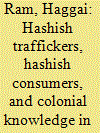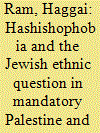|
|
|
Sort Order |
|
|
|
Items / Page
|
|
|
|
|
|
|
| Srl | Item |
| 1 |
ID:
146794


|
|
|
|
|
| Summary/Abstract |
I examine the extent to which the rise in the early 1900s of international efforts to stamp out or regulate the flow and (ab)use of hashish affected the (under)world of hashish traffickers and hashish consumers in Mandatory Palestine. A crucial phase in the global fight against cannabis, the Mandatory period serves as an excellent arena for exploring the local reverberations triggered by the reversal of the course of ‘the psychoactive revolution’, a revolution that has made drugs pervasive in human societies from the seventeenth to the nineteenth centuries. I begin by examining how hashish traffickers responded to these new conditions of control and prohibition, showing that their persistence in maintaining the illicit trade presented the authorities with unforeseen challenges. I then provide a vista into Mandatory Palestine's consuming subjects and the kinds of colonial knowledge about cannabis which helped to raise critical, racial-cum-cultural, awareness of these people, as well as to deter Jews from consuming the forbidden substance. As opposed to other regions of the British Empire (most notably India and Egypt), the history of cannabis in Palestine has not been told before. By drawing on previously untapped archival, press and literary sources, this article seeks to rectify this lacuna.
|
|
|
|
|
|
|
|
|
|
|
|
|
|
|
|
| 2 |
ID:
181016


|
|
|
|
|
| Summary/Abstract |
By drawing on crime fiction, press commentaries and archival records, this article explores Jewish public discourse about hashish in Mandatory Palestine and the first two decades of the State of Israel. Fearing over-assimilation into the Levant, Jews in interwar Palestine shunned the drug, considering it a form of ‘backwardness’ linked to the realities of living among Arabs in the Middle East. Colonial knowledge about hashish (as well as Orientalist fantasies) validated these fears, appearing to confirm that hashish was an Oriental substance that animated the pathologies inhering in Arab mentalities. This knowledge survived the transition to the Israeli state by responding to new realities: the expulsion and flight of the Arab population and the country’s repopulation by Jews from the Muslim world (Mizrahim). Some of these Jews had used hashish in their countries of origin and brought the habit with them to Israel. Others began to smoke hashish in Israel due to their socio-ethnic marginalization. Although hashish smoking in Israel in the 1950s and much of the 1960s remained limited to a few thousand members of the Mizrahi underclass, it rekindled middle-class fears of Levantinization-cum-Arabicization of the Jewish state. It also assisted in further marginalizing Mizrahim in Israeli society.
|
|
|
|
|
|
|
|
|
|
|
|
|
|
|
|
| 3 |
ID:
084762


|
|
|
|
|
| Publication |
2008.
|
| Summary/Abstract |
Held since 1956, the Eurovision Song Contest is an annual event traditionally dedicated to the eternal themes of love, peace, and harmony. Yet Israelis asked to pick a song for the 2007 contest in Helsinki paid little heed to these themes. Instead, they settled for "Push the Button," a controversial number by an Israeli punk group called Teapacks; the song is generally understood as a description of life under the threat of a nuclear-armed Iran with its "crazy rulers." Meanwhile, an Israeli fashion house (Dan Cassidy) commissioned a series of photos at a construction site in southern Tel Aviv that showed a topless model lying in a pit. The project was designed as a warning against the "holocaust" that would follow Iran's possible nuclear attack on Israel; the pit, as the project's creative director explained, represented "the mass grave of complacent Tel Aviv residents."
|
|
|
|
|
|
|
|
|
|
|
|
|
|
|
|
|
|
|
|
|